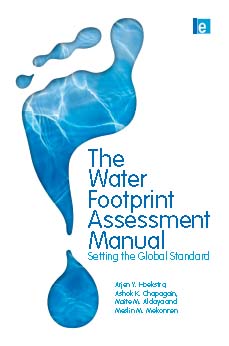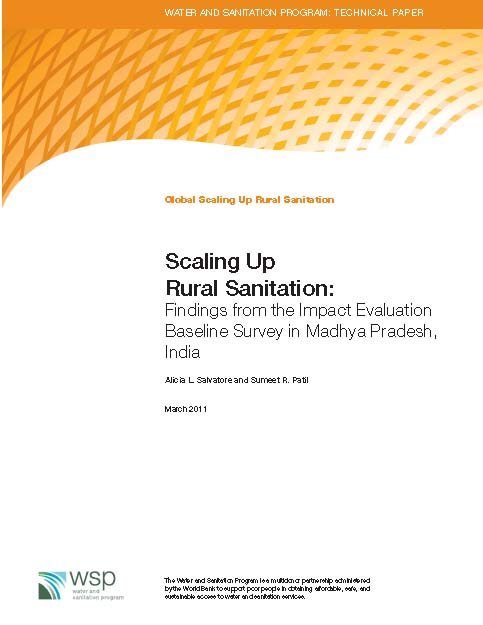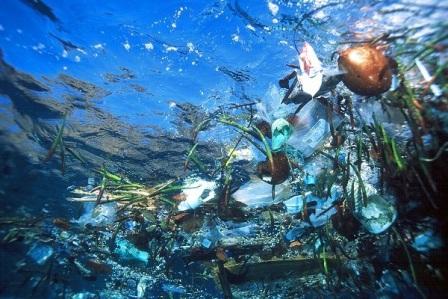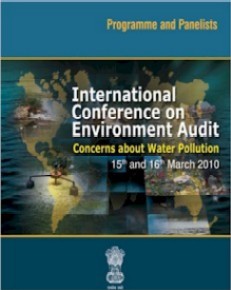/topics/international-issues
International Issues
The Water Footprint Assessment Manual: Setting the global standard – Methods for water footprint accounting by the Water Footprint Network
Posted on 21 Apr, 2011 10:14 PM This book by Earthscan contains the global standard for ‘water footprint assessment’ as developed and maintained by the Water Footprint Network (WFN). It shows how water footprints are calculated for individual processes and products, as well as for consumers, nations and businesses. It also includes methods for water footprint sustainability assessment and a library of water footprint response options.
This book by Earthscan contains the global standard for ‘water footprint assessment’ as developed and maintained by the Water Footprint Network (WFN). It shows how water footprints are calculated for individual processes and products, as well as for consumers, nations and businesses. It also includes methods for water footprint sustainability assessment and a library of water footprint response options.
A shared standard on definitions and calculation methods is crucial given the rapidly growing interest in companies and governments to use water footprint accounts as a basis for formulating sustainable water strategies and policies. The current manual is an updated, revised and expanded version of Water Footprint Manual: State of the Art 2009, published by the WFN in November 2009 (Hoekstra et al, 2009a). This new edition has been produced after intensive consultations with partners and researchers worldwide. Directly following the publication of the Water Footprint Manual, all partners of the WFN were invited to provide feedback on the manual.
Scaling up rural sanitation: Findings from the impact evaluation baseline survey in Madhya Pradesh – A report by the Water and Sanitation Program of the World Bank
Posted on 18 Apr, 2011 08:20 AM This report by the Water and Sanitation Program (WSP) of the World Bank presents the findings of the baseline and community survey conducted in two districts of Madhya Pradesh (MP) - Dhar and Khargone. The goal of the program is to reduce the risk of diarrhea and therefore increase household productivity by stimulating demand for sanitation in the lives of people. The program also seeks to stimulate the supply of appropriate sanitation program and services by conducting market research and training local artisans to build the relevant facilities.
This report by the Water and Sanitation Program (WSP) of the World Bank presents the findings of the baseline and community survey conducted in two districts of Madhya Pradesh (MP) - Dhar and Khargone. The goal of the program is to reduce the risk of diarrhea and therefore increase household productivity by stimulating demand for sanitation in the lives of people. The program also seeks to stimulate the supply of appropriate sanitation program and services by conducting market research and training local artisans to build the relevant facilities.
In India, the program is supporting the Government of India’s (GoI) Total Sanitation Campaign (TSC) in two States: Himachal Pradesh and Madhya Pradesh. The main components of the intervention include: Community-Led Total Sanitation (CLTS), Social Marketing of Sanitation, Strengthening the Enabling Environment and Nirmal Gram Puraskar (NGP) Awards.
Our Oceans - A plastic soup - Earth Institute
Posted on 28 Jan, 2011 05:07 PM Photo credit: cesarharada.com
Photo credit: cesarharada.com
Briscoe on the Indus treaty - A response from Ramaswamy Iyer - Economic and Political Weekly
Posted on 21 Jan, 2011 09:11 AMThis paper published in the Economic and Political Weekly, provides a critique of the writings by John Briscoe on the implementation of the Indus Waters Treaty and argues that it is a biased and a one sided presentation of issues, which ridicules and ignores the attempts made by India at negotiating with Pakistan and reaching a peaceful agreement over the water issue.
Embankments related compensation to drain Indian exchequer : Need to review the flood control policy of the Government
Posted on 16 Dec, 2010 03:14 PMGovernment of Nepal has asked the Government of India to compensate its citizens badly affected by embankments and other flood control measures taken on river Gandak. Will this not lead to a flood of demands for compensation by the victims of similar problems in other river basins like the Bagmati, the Kamala and the Kosi?
"Gujarat farmers fight against climate change: Adopt technoloxxgy to conserve resources and maximize benefits" : News roundup (15-21 October 2010)
Posted on 22 Oct, 2010 11:25 AMClimate Change
Limits of law in counter-hegemonic globalization: The Indian Supreme Court and the Narmada valley struggle
Posted on 18 Oct, 2010 08:10 PMThis working paper by the Centre for the Study of Law and Governance, Jawaharlal Nehru University offers an analysis of the role of law in the Narmada valley struggle, especially that which was waged by one of India’s most prominent social movements in recent years, Narmada Bachao Andolan (NBA), with a specific focus on India’s Supreme Court. The NBA rose in reaction to the Indian government’s plan to construct a large number of dams along the Narmada river, contesting the relief and rehabilitation provided for displaced families at first, and subsequently challenging the dams themselves as being destructive.
Water security vs national security published in Third Concept September 2010 : Countries that share a river face a higher probability of engaging in military disputes
Posted on 28 Sep, 2010 10:15 AMThere has been growing public and policy preoccupation in recent years with potential climate impacts on water security in the wake of the worsening risk of global warming. In 1991, then–UN secretary general Boutros Boutros-Ghali pronounced that “the next war will be fought over water, not politics.” In 2001, Kofi Annan warned that “fierce competition for fresh water may well become a source of conflict and wars in the future.” And present UN secretary general Ban Ki-Moon has argued that the ongoing Darfur crisis grew at least in part from desertification, ecological degradation, and a scarcity of resources, foremost among them water. Apart from this chorus of concern, many policy scholars have asserted that, as population growth and economic development raise pressures on demand and environmental pressures degrade supplies, resource scarcities could precipitate violent international conflicts, with shared rivers an especially dangerous flashpoint.
International conference on environment audit - Concerns about water pollution - CAG (2010)
Posted on 10 Sep, 2010 05:15 PM This link on the CAG website provides the details of an international conference that was held on 15-16 March 2010, in the backdrop of the environmental audit proposed by the the Comptroller and Auditor General (CAG) of India, for management and conservation of the environment .
This link on the CAG website provides the details of an international conference that was held on 15-16 March 2010, in the backdrop of the environmental audit proposed by the the Comptroller and Auditor General (CAG) of India, for management and conservation of the environment .
The purpose of this conference was to deliberate on the causes of pollution, action taken by governments and civil society to address this and environmental, management and legal interventions needed to put lakes, rivers and ground water on the path of sustainability.
More than 20 experts on water and water pollution issues were invited to share their views as panelists during the conference. Apart from these distinguished panelists, the heads of supreme audit institutions from countries like Austria, Maldives, Bangladesh and Bhutan were also present to share their experiences regarding audit of water pollution in their countries.





